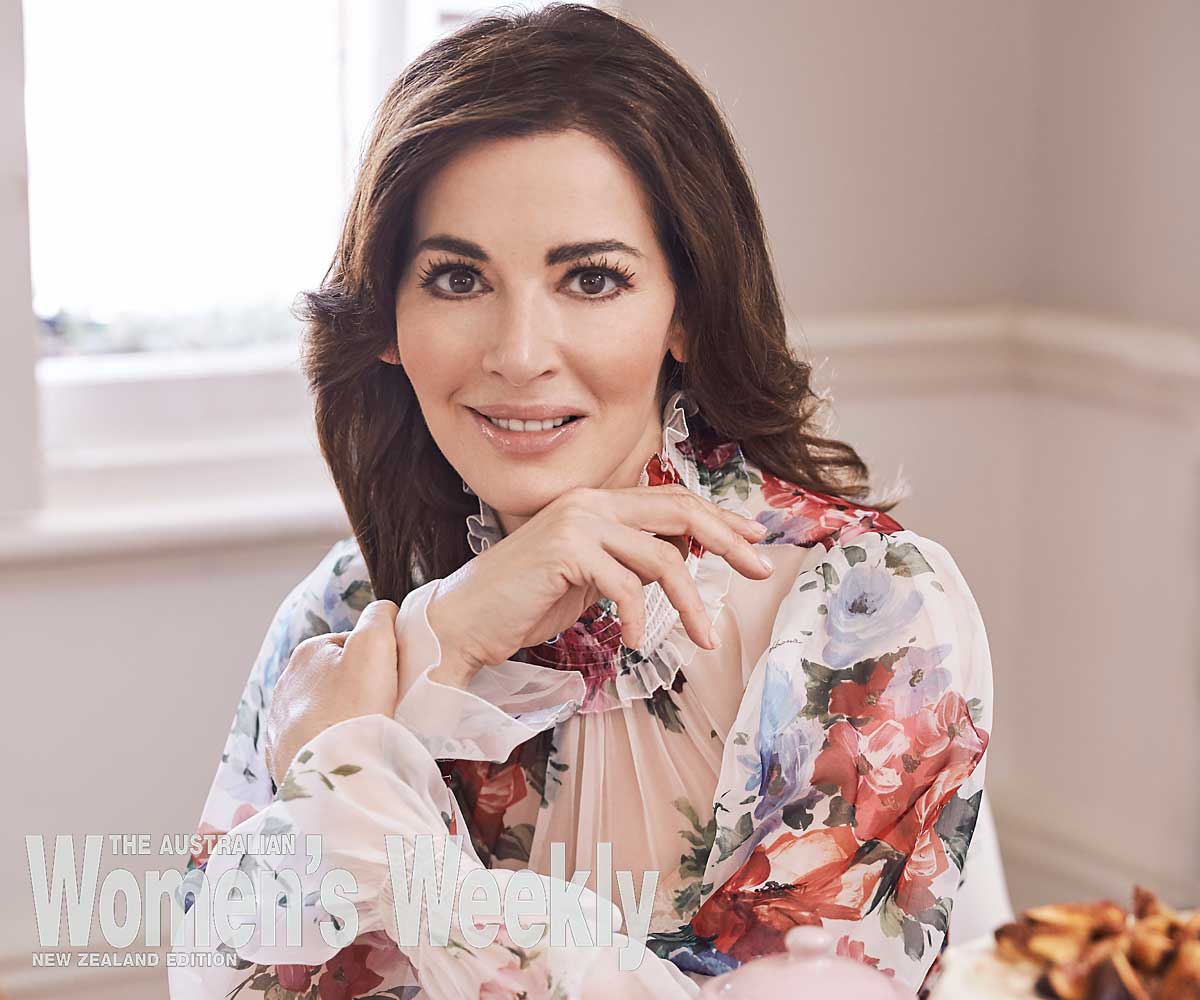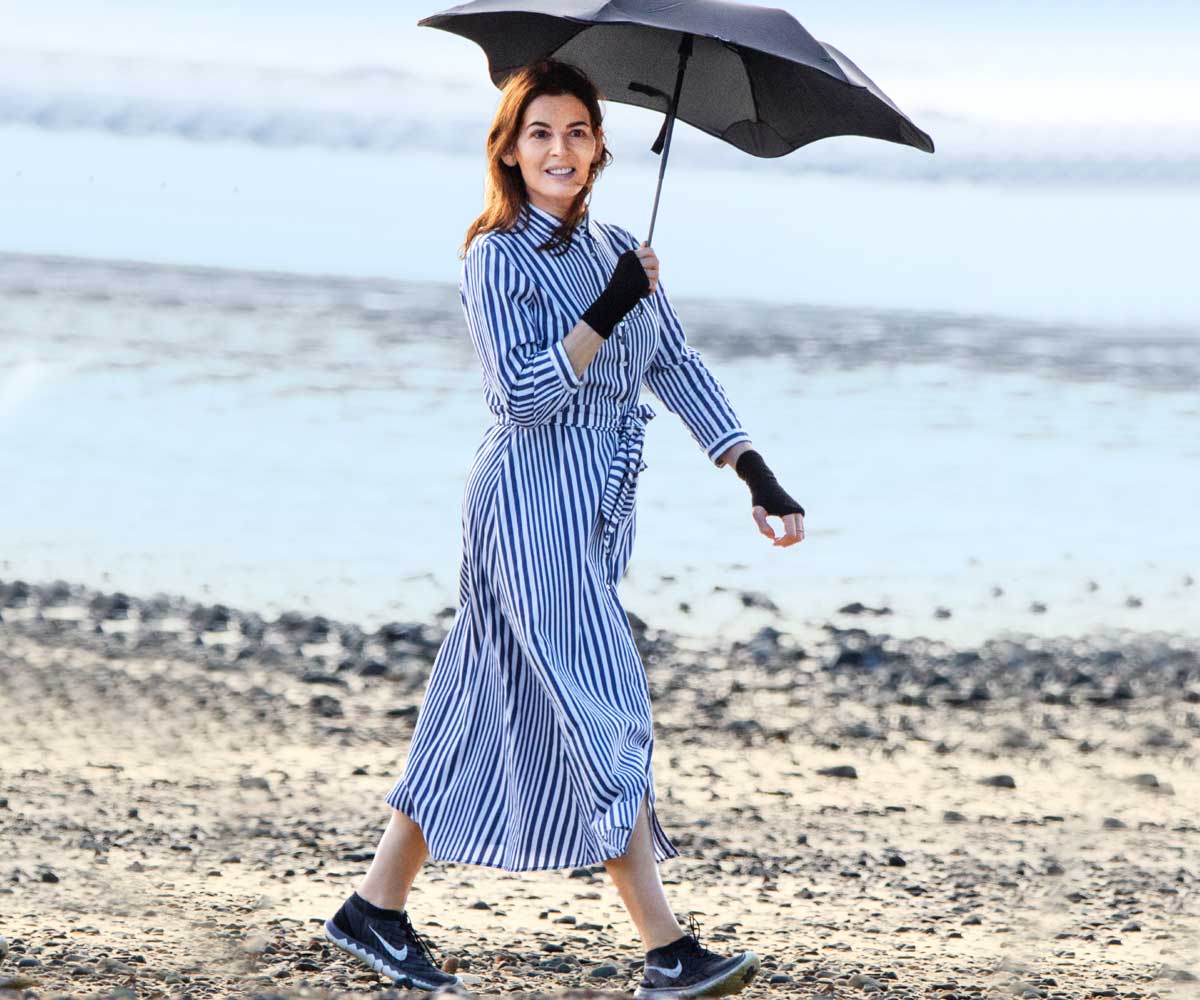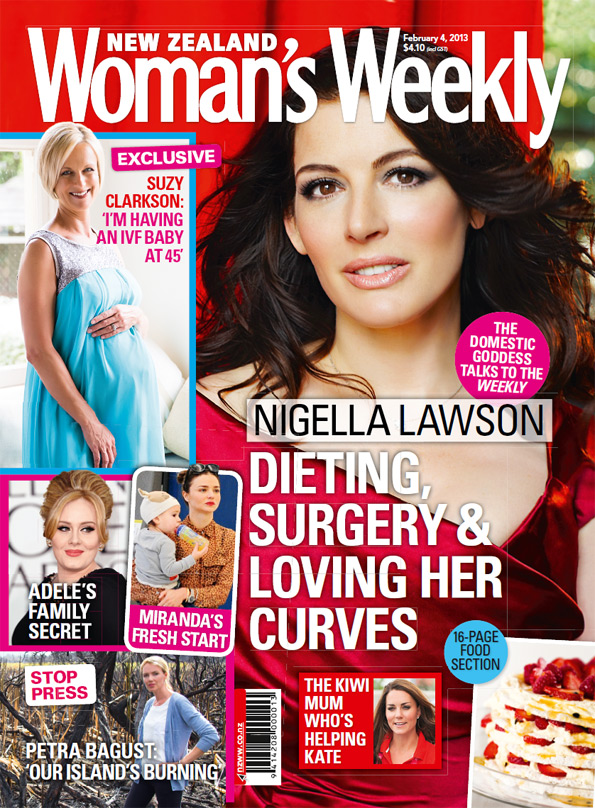Nigella Lawson pitter-patters barefoot across cool tiles in a high-ceilinged Victorian kitchen. Between set-ups for The Australian Women’s Weekly’s photo shoot, she has slipped back into her simple black slacks and T-shirt and come foraging for lunch. The larder is stocked with every delicacy imaginable but the queen of British home cookery goes straight for a crusty loaf of sourdough bread and spreads a slice thickly with sunshine-yellow cultured butter. She washes it down with a cup of English breakfast tea strong enough to stand a spoon in.
“Perfect,” Nigella observes with that cryptic half-smile she sometimes employs onscreen when contemplating caramel. “I’m very particular about bread and butter,” she adds.
Whether making short work of a bunch of parsley with her trusty mezzaluna or whisking a mountain of glistening meringue, Nigella’s approach to food is always a celebration of life’s bounty. This seems somehow incongruous because, at 58, she has lived more closely with death than most of us would choose. Her mother, her much loved sister, Thomasina, and her first husband, the journalist John Diamond, were all felled young by cancer. She was carer to both her mother (who died at 48, when Nigella was in her 20s) and her husband, who passed away in 2001.
“I think my food is a celebration of life,” she agrees, after a moment’s quiet pondering, “and yes, those things are linked.”
She has carried her bread and tea to a quiet corner of the house and curled up on a comfy couch.
“When you see people lose their life young, it seems almost criminal,” she says. “It’s like treating that as if it didn’t matter if you don’t make the most of what is here… I feel that eating is so much about grabbing the moment. While I’ve been in Australia, if someone has said to me, ‘Oh there’s a really wonderful ice-cream shop,’ then I’ve wanted to stop and try it because what’s the point of being alive if you don’t grab things that are wonderful?
“So I do feel this sense of urgency sometimes. I don’t want to waste life. It feels so ungrateful not to take pleasure. People say to me, what’s your guilty pleasure? And I think, why should I feel guilty about pleasure? I think the only thing you should feel guilty about is not taking pleasure. You have to take pleasure in life while you can because people have that ripped away from them.
“Also, so many of my memories of people I love involve food. I don’t think I would have written my first book [How to Eat] if it weren’t for my need to memorialise my sister and mother. That was very important for me. My children [Cosima and Bruno, now in their 20s] didn’t know my mother, so for them to eat her food means an awful lot and that can only happen if I cook it.”
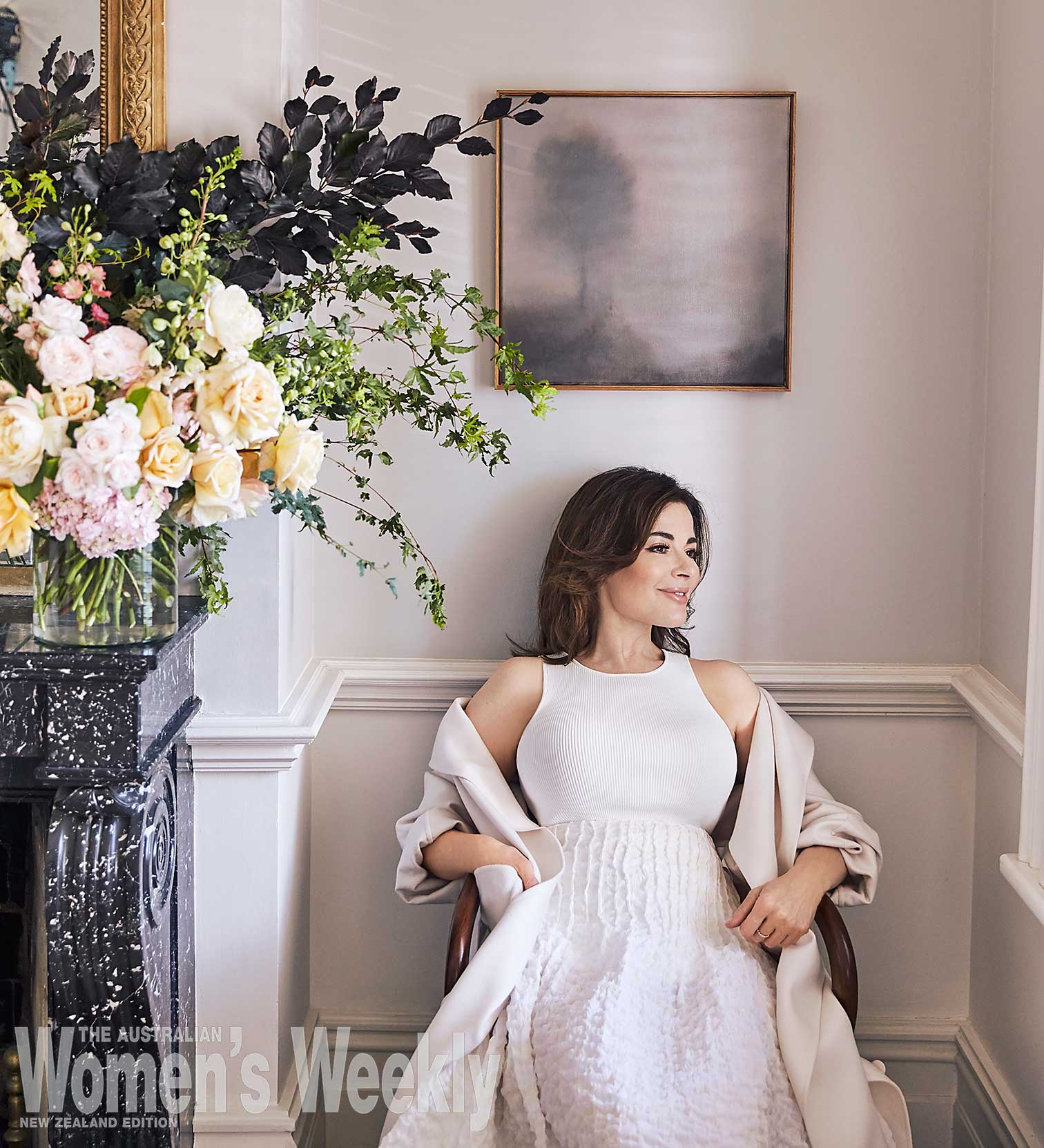
It’s curious that her mother’s home cooking ultimately nudged Nigella towards success, when it was such a trial to her as a child. Her mother, Vanessa, was beautiful, elfin in an Audrey Hepburn way, born of a wealthy Anglo-Jewish family in the food business.
She was also depressive, quick-tempered and insisted that her children eat every morsel on their plates. Unfinished meals were served up again, cold, the following day. As a result, Nigella dreaded mealtimes and ate only grudgingly, but she learnt to cook, with Thomasina, helping their mother in the kitchen, imbibing both technique and intuition.
That intuition proved particularly useful at Oxford, where Nigella went on to study medieval and modern languages and regularly fed tribes of poor and hungry undergraduates.
The ingredients of her now legendary soups were dictated by what was cheap at the markets but potatoes, onions and improvisation were mainstays.
Nigella remains a great improviser. “For me, cooking is very much about leftovers,” she says, “so a lot will be decided by what’s in the fridge. If I had a roast chicken on Sunday night, then there are so many different possibilities that can come from that.
I think a home cook often starts from the position of leftovers, whereas a chef goes to the market and starts afresh.”
Yesterday, The Australian Women’s Weekly spent the afternoon watching from the sidelines as Nigella filmed an episode of MasterChef Australia’s much anticipated 10th anniversary series (returning to TVNZ 1 mid-year). To be honest, we had expected her to be a little bit precious and princessy. She wasn’t.
When the cameras stopped rolling and the other judges wandered off-set or joked with the crew, Nigella mingled with the star-struck contestants, putting them at ease with her warmth and gentle chatter, offering tips and answering questions. None of this was required. She could have been sipping chardonnay in the green room.
“Companionable cooking is such a treat,” she told them and she expands on that theme today.
“I like cooking with people who know me well and know my kitchen well. I used to love cooking with Thomasina [who died aged 32]. I loved cooking for her and with her and just talking to her while I cooked. I have a very good friend and we sometimes cook together, too. It’s a lovely thing to do.
“I also think it’s a wonderful way of talking with people generally. A lot of people are more comfortable talking when your attention is a bit elsewhere. So, if you have a friend or a child or anyone who is going through a difficult time and wants to talk about things that aren’t easy, I think you stand much more of a chance if you’re chopping some carrots at the same time.
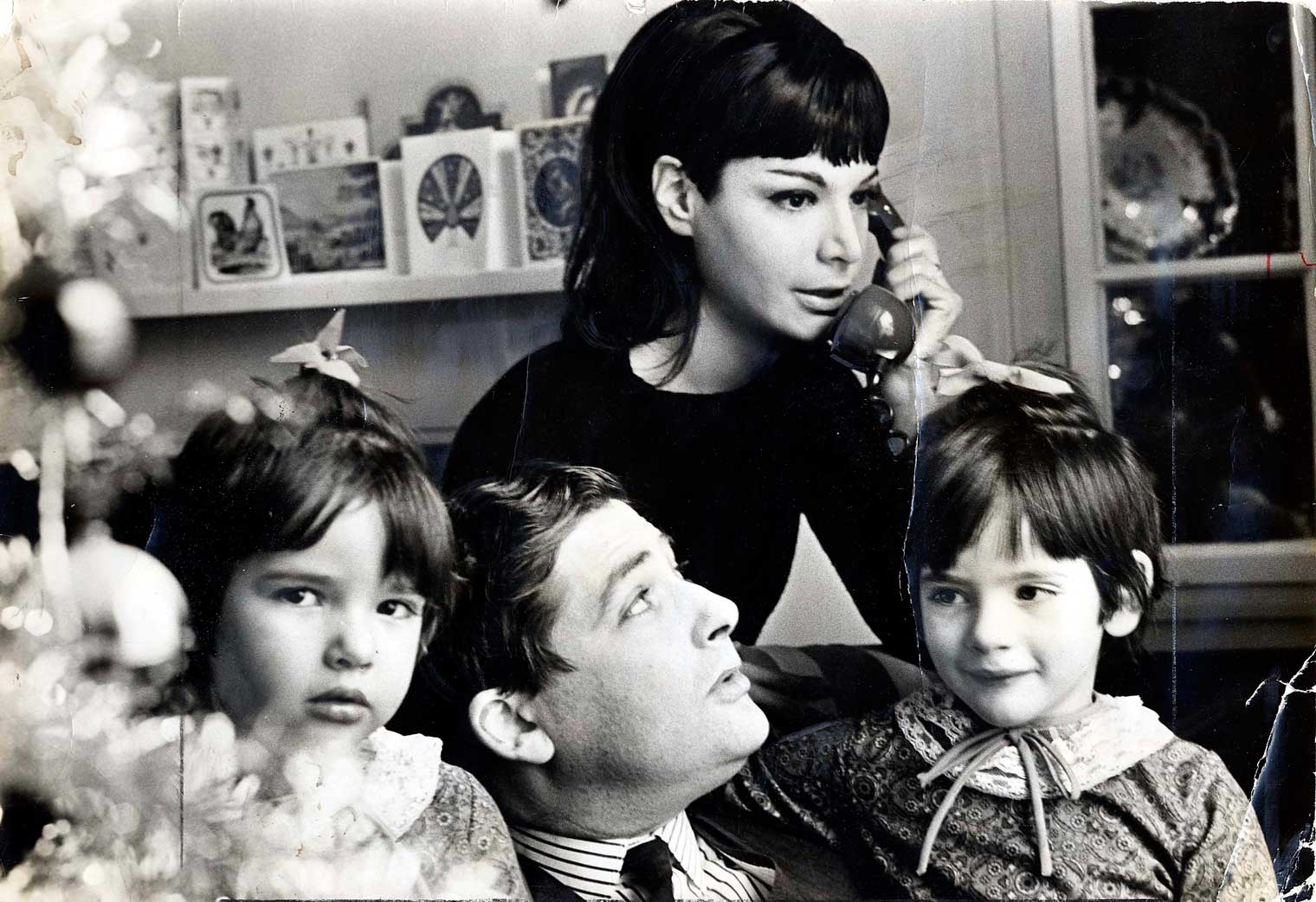
It’s rather like the way people sometimes feel they have important conversations while they’re driving. People are more relaxed when you haven’t got full-beam on them.
So I quite like chatting while I cook. The other person doesn’t need to be cooking with me. Sometimes they can just be there, having a glass of wine while I’m chopping and stirring and unwinding. I like that.”
The rest of the world seems endlessly fascinated by the evolution of her shape and size and, while Nigella insists that she’s very comfortable in her own skin, she concedes that many women’s relationships with body and diet
are more problematic.
“It’s a huge subject,” she begins.
“One is expected to be a certain shape and it’s not a shape that many women are naturally. I think that is difficult. There isn’t just one way to be.
“I don’t prize extreme thinness. I don’t equate thinness with health. So many people want to be unnaturally thin, which means they are going to have a struggle every day for the rest of their lives.
“My mother had a bit of an eating disorder so, for me, it was very important not to be like that… It means a lot to me that my first book is used in eating disorder clinics and a lot of young women have written to me saying how it has helped them.
to make friends with food rather than feeling that it’s an enemy. That means an awful lot to me. I think cooking helps. It helps to have a relationship with food in as many parts of the process as possible: growing food, shopping for food, preparing food… You have to start by learning respect for the food and respect for yourself, and it can be hard.
“Also, if you can give yourself permission to eat, then I think the rest does follow. Because of the way a lot of women think of themselves and their bodies, and because of the way society encourages us to think so destructively, it’s not always as easy as it sounds, but it is a lesson that can be learnt. I eat healthily because I eat a bit of everything and I eat what my body tells me it wants. I don’t deprive myself.”
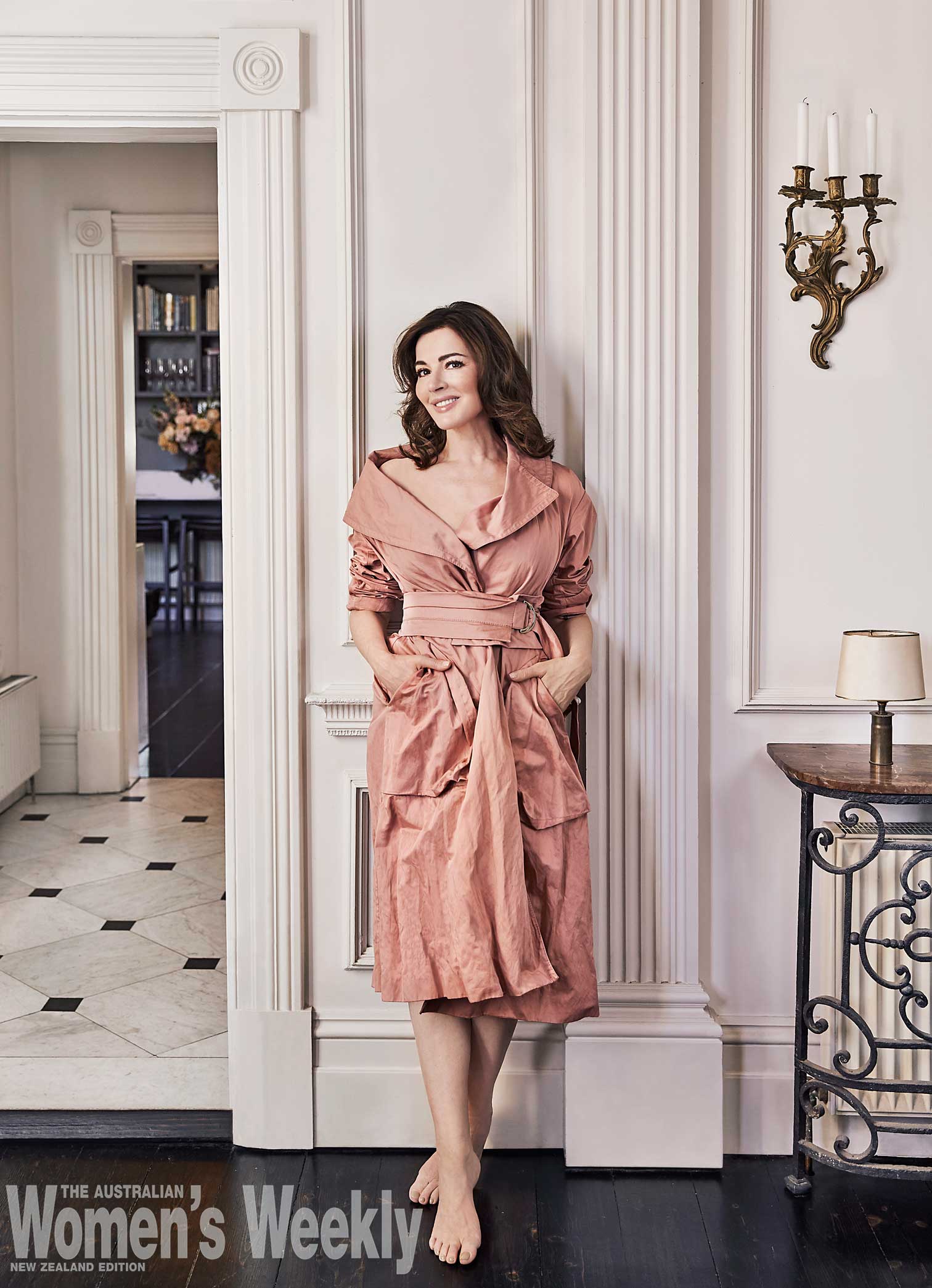
Nigella became something of a cause célèbre for young feminists when she left her second husband, the advertising and art gallery mogul, Charles Saatchi, in 2013. The impetus was the publication of a photograph in which Charles was apparently trying to throttle Nigella at a Mayfair restaurant during his birthday lunch.
There followed a quick divorce and a lengthy, grubby court case, during which two employees were accused of fraud and Nigella of drug use. Through it all, her reputation remained, miraculously, barely sullied and today she will speak about none of it.
She is hopeful that this next generation of young women (many of whom jumped swiftly to her defence when Charles’ apparent attack was made public) will keep reimagining feminism with gusto. “It’s interesting,” she suggests, “to have a generation of women who have not been brought up to, as Virginia Woolf said [in A Room of One’s Own], reflect ‘the figure of man’ back at ‘twice its natural size’. I think that’s good.”
Nigella is quite the kitchen philosopher. In her most recent book, At My Table, she quotes the 19th-century Danish theologian, Kierkegaard, on whether to impose order upon cookbooks or life. “I don’t believe there is a divine purpose,” she says, “or I think much of our purpose is to do with our relationships with one another. I think a moral code is important but I think the universe is chaotic and random.”
Nigella considers herself an atheist and for the most part, she says, she doesn’t try to make sense of life. “I don’t know that life makes sense,” she shrugs. “Isn’t that why we read? Because the randomness of life has to somehow be created into something that has a narrative force and a narrative arc. That’s what we look for in fiction but I don’t know how much life has of that really.”
If the lives, deaths and upheavals around her have taught Nigella anything, it is that the surest place to find meaning is in the moment. “One of the reasons I like cooking is that it forces me into the moment, and that’s good,” she explains, “as I’m rather an anxious person.”
What life can deliver, she maintains, in quiet, conscious moments, is an abundance of joy.
“I feel, and maybe this sounds trivial,” she says, “that joy can be so profound. It can be lying with someone you love or having your arms around your children. Yet it can also be a blue sky; the perfect bit of bread and butter; fresh, crisp, clean sheets. It doesn’t have to be big and serious. Joy is often in those tiny moments that belong to the world of the senses, and I think that’s where I’m happiest.”
